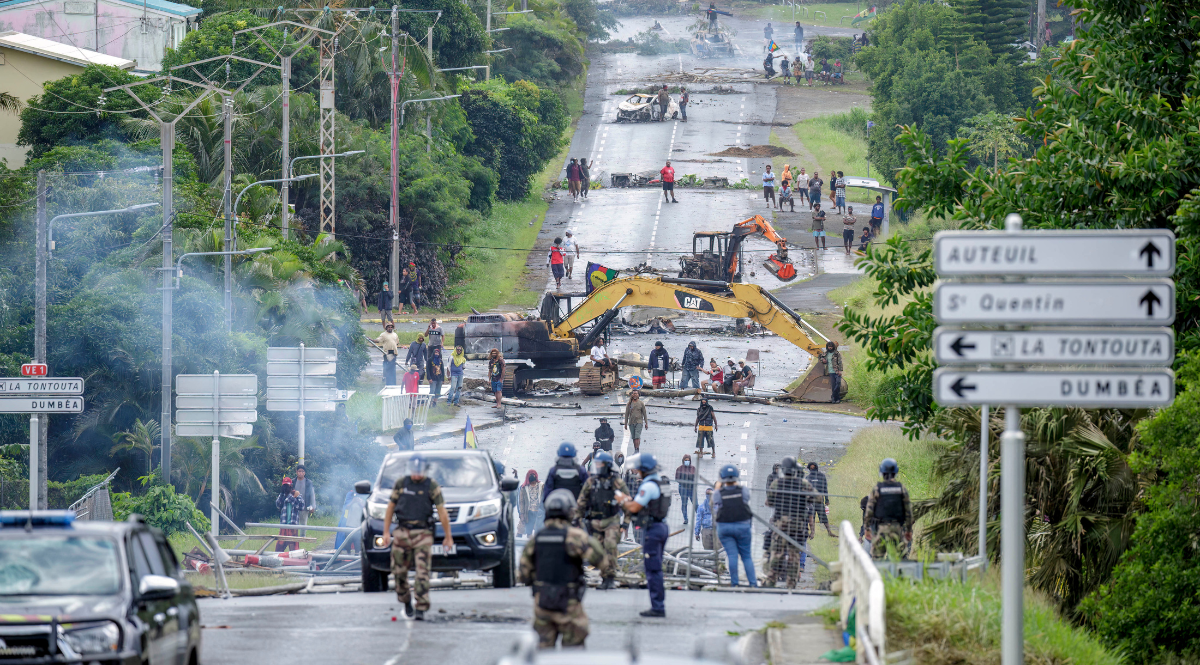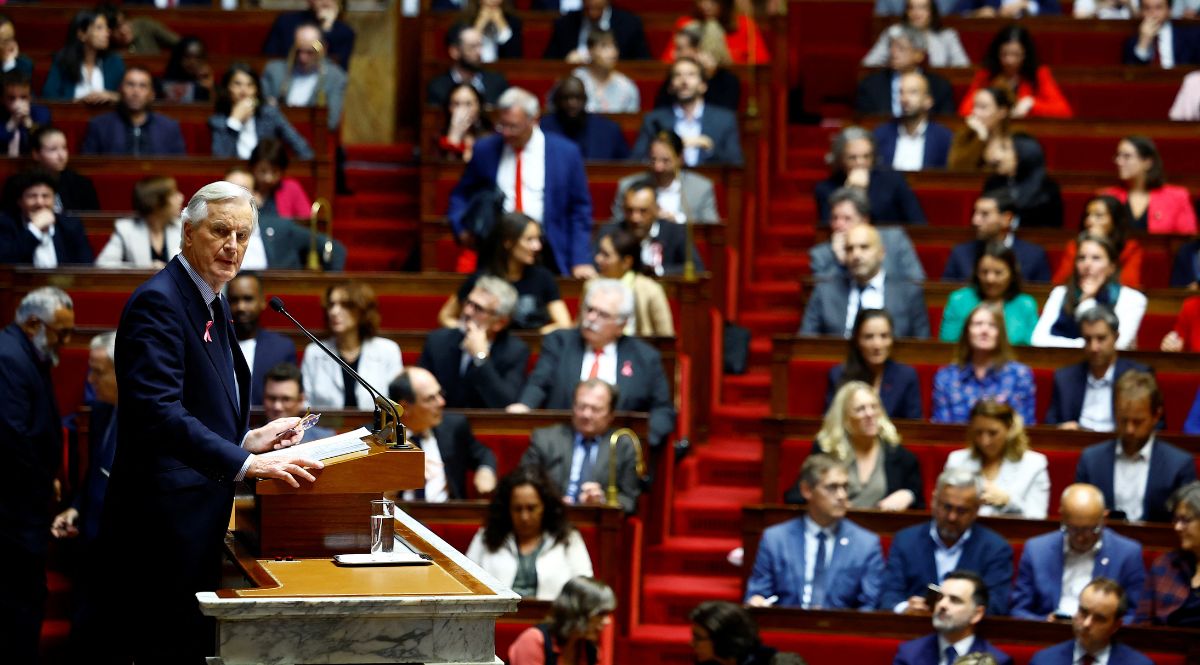Independence Push, Economic Challenges Creating Uncertain Future for New Caledonia
New Caledonia’s social and economic crisis is deepening. President Emmanuel Macron’s proposed changes to the local election rules have faced significant opposition from residents and reignited discussions about the archipelago’s status. The nickel mining and processing industry in New Caledonia is confronting economic challenges but remains vital to the country’s raw materials policy. Stabilising the situation in New Caledonia is crucial for France’s ability to pursue its strategic interests in the Pacific.
 MMIIAS/ABACA / Abaca Press / Forum
MMIIAS/ABACA / Abaca Press / Forum
New Caledonia is a French-dependent territory situated in the Pacific Ocean, with a population of about 270,000 people. France has more than a dozen territories in various regions, including the Atlantic, Pacific, and Indian Oceans, as well as French Guiana in South America and the French Southern and Antarctic Lands. New Caledonia plays a crucial role in ensuring the French presence in the region and executing France’s strategy for the Indo-Pacific (first published in 2018 and updated in 2021), including supporting the French Armed Forces in the Pacific, monitoring the situation in the regional security environment in cooperation with its main partners, (the U.S., Australia, and New Zealand). France is the only EU country that has territories in the Pacific. New Caledonia is a member of the Pacific Islands Forum, which is a political organisation that promotes regional cooperation.
Socio-political Situation
Pro-independence movements in New Caledonia have been gaining strength since the 1970s. The Nouméa Accord of 1998 determined the course of the decolonisation process and the transfer of powers increasing New Caledonia’s autonomy (e.g., in education, foreign trade, labour law, or regulations regarding critical raw materials), bringing temporary political stability. It also included a referendum on self-determination and, if the pro-independence option was not selected, allowed for two additional votes. In the three independence referendums held in 2018, 2020, and 2021, the majority of the population voted against separation from France. However, this did not alleviate tensions between separatists, who are mostly indigenous people motivated by economic inequalities, and loyalists, comprised of anti-independence residents mainly descended from settlers or those who arrived from metropolitan France in recent years.
Since 13 May, unprecedented protests and riots have erupted across the archipelago, reminiscent of the scale not seen since the 1980s. The demonstrators, many of whom support independence, protested against the constitutional reform considered in the French parliament aimed to amend electoral law and expand the electorate to include individuals who have lived in the territory for at least 10 years, potentially increasing the number of eligible voters by 14.5%. Until now, only the indigenous population, the Kanaks (about 40% of the population), and citizens who were living in the territory before 1998 could vote. Thirteen people have died during the protests, leading authorities to impose a state of emergency.
The Kanaks believe that the government’s proposal to modify the electoral law would undermine their political influence. Local elections that determine the representation of political parties in the Congress of New Caledonia were due to be held in 2024. After widespread protests, the French parliament decided to postpone the elections, which are now scheduled to take place by the end of November 2025. These protests are occurring within a broader context of social tensions between the Kanak population and immigrants. Under pressure from the local community, President Macron suspended further action on the reform in June and softened his position. He expressed a desire to allow time for local political groups to come to an agreement regarding the territory’s future and its relationship with France. He announced that a comprehensive agreement should cover the issue of electoral rights, the structure of local government, citizens’ rights and the future of the affected nickel mines. The conclusion of an agreement and the development of a common policy has been hampered by disputes and power struggles between separatist groups, which led to their representative losing his position as president of Congress—Roch Wamytan, a pro-independence politician who has held the position since 2019. He signed a memorandum of cooperation between the Congress of New Caledonia and the Azerbaijan National Assembly amidst this year’s unrest. The French authorities criticized this decision, viewing it as third-country interference in France’s overseas territories. Azerbaijan’s response came as a result of France’s support for Armenia in the ongoing territorial conflict between the two countries.
The new French Prime Minister Michel Barnier established a separate position of minister to the prime minister responsible for overseas territories and appointed former Republican Senator François-Noël Buffet to the role. Previously, policy issues regarding overseas territories have been overseen by the Ministry of the Interior. The authorities aim to enhance communication between state institutions and local political actors; François-Noël Buffet and the presidents of both houses of the French Parliament have already visited New Caledonia.
Economic Situation
New Caledonia’s economic situation has significantly deteriorated due to the riots. Losses to the local economy are estimated at around €2.2 billion, with the territory’s GDP declining by more than 20% since March. The challenges are intensified by the decline of the nickel industry, which is crucial to the archipelago. Nickel ore is an essential raw material and particularly important for the energy transformation. It is used in the production of batteries for electric vehicles, as well as in the pharmaceutical industry and the manufacturing of stainless steel, which is vital for the aerospace sector. New Caledonia has significant deposits of nickel ore comprising about 25% of the world’s reserves. In 2023, New Caledonia was the third-largest producer of nickel globally, following Indonesia and the Philippines, and contributing 5.6% of the world’s total nickel production.
The nickel industry in New Caledonia represents about 20-25% of private sector employment and contributes about 20% to the territory’s GDP. Nickel is also responsible for around 90% of New Caledonia’s exports. The French government has recognised the nickel industry as strategically important for the local economy and the French electric vehicle battery sector. Output from the three mines in the territory is projected to meet up to 85% of the French battery gigafactories’ demand by 2030, or 14% of EU demand by 2035.
The nickel mining and processing sector, however, is facing significant challenges due to high energy costs, primarily because New Caledonia relies on imported oil and coal for over 80% of its energy needs. Additionally, the industry is under increasing pressure from competition with Indonesia, which has rapidly become the world’s largest producer of nickel ore. Indonesia’s decision to ban the export of nickel ore has also led to a lawsuit from the European Union at the WTO. Chinese investment in nickel refining in Indonesia is on the rise, enabling the country to gain control over supply chains. This influx of investment has resulted in a threefold increase in nickel production in Indonesia over the past five years and a significant decline in nickel prices. Consequently, New Caledonia’s plants have experienced record losses.
At the end of August, the Koniambo Nickel SAS (KNS) nickel processing plant in northern New Caledonia, which generated over 1,200 direct jobs and about 700 indirect jobs, was shut down. It was majority-owned (51%) by the New Caledonian mining and metals group Société Minière du Sud Pacifique SA (SMSP), which itself is majority-owned by the Northern Province of New Caledonia, and 49% by the Swiss company Glencore. The plant has played a significant role in boosting economic development in the northern part of the island. Since it was established, the population in that area has increased by 40%. Additionally, the number of businesses in the surrounding communities has risen from 2,500 in 2005 to 4,000 today. Glencore decided to withdraw from its investments because of the global nickel price crisis and rising energy costs in New Caledonia. As a result of the closure of KNS, more than a third of private sector employees have lost their jobs, increasing the likelihood of an exodus of part of the workforce.
Conclusions
Stabilisation of the social and economic situation in New Caledonia will depend on the outcome of the new French government’s dialogue with the local political parties and social movements regarding a new socio-economic model for the archipelago. France views keeping New Caledonia as one of its overseas territories as essential to implementing its strategy in the Indo-Pacific. Rising independence movements may influence other French overseas territories. The potential decrease in nickel mining and processing may hinder France’s ability to secure this strategic resource. The situation could result in an increased concentration of global nickel production, which could slow the EU’s efforts to diversify its supply and weaken its competitiveness with China. Maintaining extraction will determine the implementation of the French raw materials security strategy, the development of French gigafactories, the success of ecological transformation plans, and the EU’s raw materials security in the event that third countries implement policies limiting the export of critical raw materials.



.jpg)
.png)
